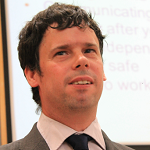Blog from Lisa Hopkins and Scott Watkin BEM on inclusive working at SeeAbility

Lisa says: “At SeeAbility our ambition and vision is for ‘inclusive communities where people with sight loss, autism, and learning disabilities participate as equal citizens.’ Lately we’ve been shaping up just what we can do to address one the most fundamental barriers to participation and that’s employment.
When we first meet people we support, we ask them what they do and what their ambitions are (including “what career do you want to have?”). And we want to ensure that we have a diverse workforce, so that opportunities within SeeAbility are available to everyone.
We know that employment contributes to being healthier, happier, having more friends, and often leads to intimate relationships. These are all things that people with learning disabilities want as well. They want to make a positive contribution to their communities and they want to feel valued in the same way everyone else does.

Scott says his experience is typical though of the attitudes that people with learning disabilities face.
“I was told at my special school that I would never be able to be employed. There was never any sign posting for where I could go and find out about employment. Even when I thought about work I felt I would have to prove myself to the employer that I could do the job.
My world changed when a lady called Sue met me at a day centre and said I was wasted. She asked me to get involved Isle of Wight Learning Disability Partnership board. Going to those meetings I got more confident, I knew I wanted to work.
Since then I have had many different roles from being a volunteer to paid employment. I was one of the lucky ones because someone gave me a chance.
I’m now 37 and I work for SeeAbility as Head of Engagement (the first person with a learning disability on the Leadership team). When I first came to the organisation five years ago, SeeAbility supported me to travel the country talking about eye care and vision. I had to learn the best way to travel and I did get lost a few times. So I could do my job, they took the time to help me understand every part of my role. They made sure I had everything ready so when I stood on stage I could just present and tell my jokes too!
In the last two years I have won several awards. The Making a difference Award at the National Learning Disabilities and Autism Awards and in 2018 I received a British Empire Medal in the New Years Honours list.
Lisa continues:
It strikes me that Scott believes he’s one of the “lucky ones to be employed”. Lucky ones! This is about equality. I didn’t grow up thinking I’d be lucky to get a job, I grew up thinking I’d be lucky to get a good job and I dreamt about what that might be, because the people around me also held those same ambitions. We inevitably ask children what they want to be when they grow up, but we don’t always ask this of children with disabilities.
Unfortunately, only 6% of people with learning disabilities known to their local authority are in paid work. Whilst there are many reasons for why this statistic is so low, I can’t help but think that part of the problem is that we as a society simply don’t think that work is always positive and possible for people with learning disabilities. This is about basic equality and we’re getting it wrong.
Scott’s experience has inspired us to do more at SeeAbility. We’re investing in a Supported Employment team to help people achieve their ambitions and demonstrate the business case to employers about why it’s good business to employ people with learning disabilities and autism.
We also have ambitious targets for our own employees. We believe that a diverse workforce is better for everyone and enriches us all as a result. At the moment, just under 10% of our colleagues have disabilities, which we know isn’t good enough. We’re committed to demonstrating what’s really positive and possible when we work together to make employment a reality for everyone.
The final word goes to Scott. “I did not think I would get to where I am today and with the right support achieve what I have achieved. The employer and support staff need to believe in you as we are very reliable people and can achieve what somebody without learning disability and autism can achieve.”